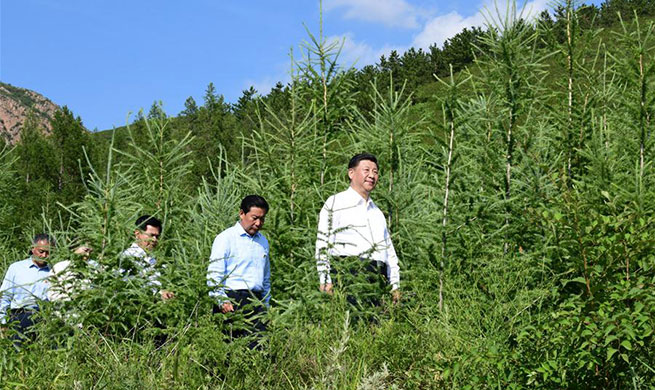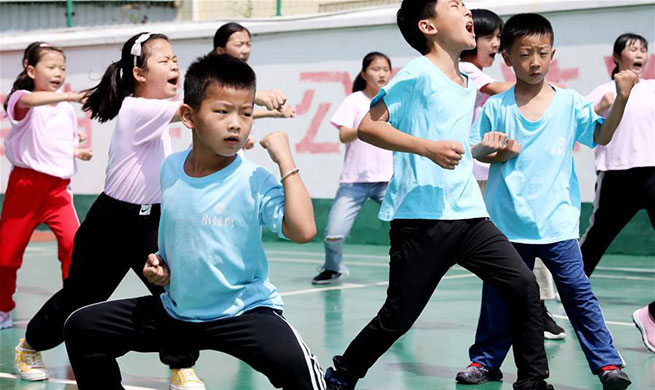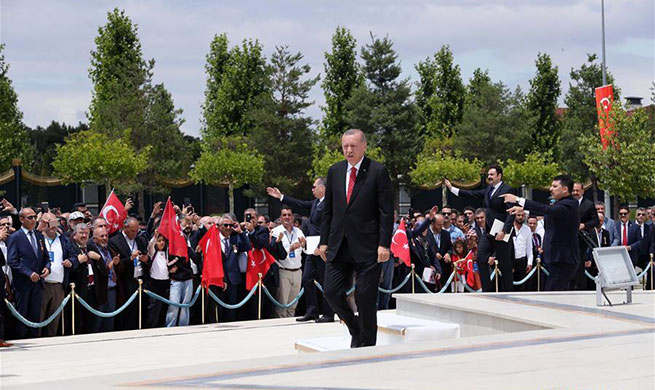NAIROBI, July 15 (Xinhua) -- Jessica Gimo is yet to overcome the painful memories of her encounter with devastations wrought by Cyclone Idai that battered her native country of Mozambique in March this year.
The 25-year-old law major and volunteer with a grassroots environmental conservation network is convinced that climate change was partly to blame for the catastrophe that swept across the southeast African region, killing an estimated 900 people and displacing more than 1.5 million others.
Speaking at an international climate change forum held in Nairobi on Monday, Gimo said the worst cyclone ever to hit the southern hemisphere was a wake-up call for the youth to be on the frontline of efforts to advocate sustainable practices that are key to protecting the planet and its natural resources.
"When cyclone Idai battered Mozambique, the destruction it left in its wake was too gruesome and myself in particular almost lost family members who were marooned in their homesteads but were rescued by well-wishers," said Gimo.
She revealed that a visit to her grandmother's residence near Beira port in central Mozambique shed light on the depth of a humanitarian crisis that attracted global attention.
"It was during the tour of my grandmother's homestead that was completely flooded that I came face to face with the grim reality of lost livelihoods though her neighbors were on hand to lend support," said Gimo.
She has joined a growing rank of African youth who have become climate change warriors as the phenomenon poses existential threat to the continent's economies, communities and ecosystems.
More than 360 young people who attended the international climate change conference in Nairobi were united in their resolve to leverage on their energy and creativity to help their countries withstand a phenomenon that is to blame for worsening habitat loss, hunger, water scarcity and infectious diseases.
The two-day summit that was organized by the United Nations Environment Programme (UNEP) in partnership with green advocacy groups and faith-based organizations, underscored the critical role of African youth to promote climate resilience in the continent.
Joyce Msuya, deputy executive director of UNEP, said climate and biodiversity crisis that has become pronounced in Africa requires bold intervention from the youthful demographic to minimize its negative impacts.
"There should be bold actions coming from the African youth to help limit the devastating impacts of climate change on the continent. These youth are key to helping educate communities on practices that promote sustainability," said Msuya.
Christine Kasengele, a 25-year-old education major from Zambia who is a member of a community-based climate change advocacy group, said that greater involvement of the youth is key to achieving Africa's green and sustainability agenda.
"The youth of this continent are requesting our governments to develop friendly policies that can inspire us to make significant contribution to climate change fight," said Kasengele.
"Climate change is now an emergency and it threatens our collective future. The youth should be involved in reforestation and promotion of clean energy to minimize carbon emissions," she added.
African youth have rallied behind innovations that aim to enhance the capacity of local communities to cope with negative impacts of climate change like droughts, hunger and loss of biodiversity.
Dennis Murefu, a 30-year-old Kenyan communication specialist and founder of an organization that promotes organic farming, said the youth have a duty to educate communities on food production systems that are climate resilient.
"It is high time the youth took over the roles of educators and influencers to help our communities deal with an ever present threat of a warming planet to their livelihoods," said Murefu.
"One area I think the youth can be more effective is training communities how to carry out climate-smart agriculture and make use of solar and other forms of renewable energy," he added.
Experts attending the forum agreed that African youth who comprise more than 60 percent of the population are key to accelerating the continent's green transformation through promotion of innovations that tackles climate change.
Gary Lewis, director of UNEP's Program and Policy Division, said that African governments should ensure the youth are adequately involved in the implementation of projects that promote climate resilience.













